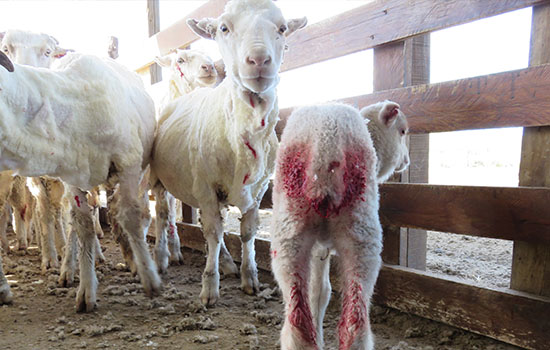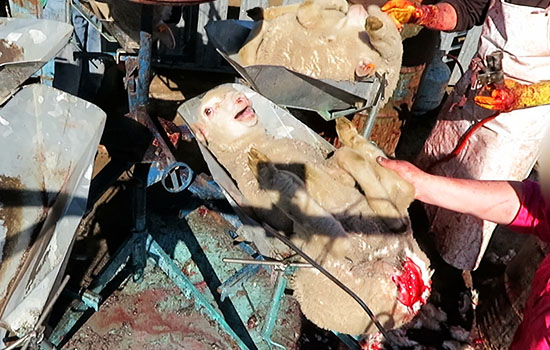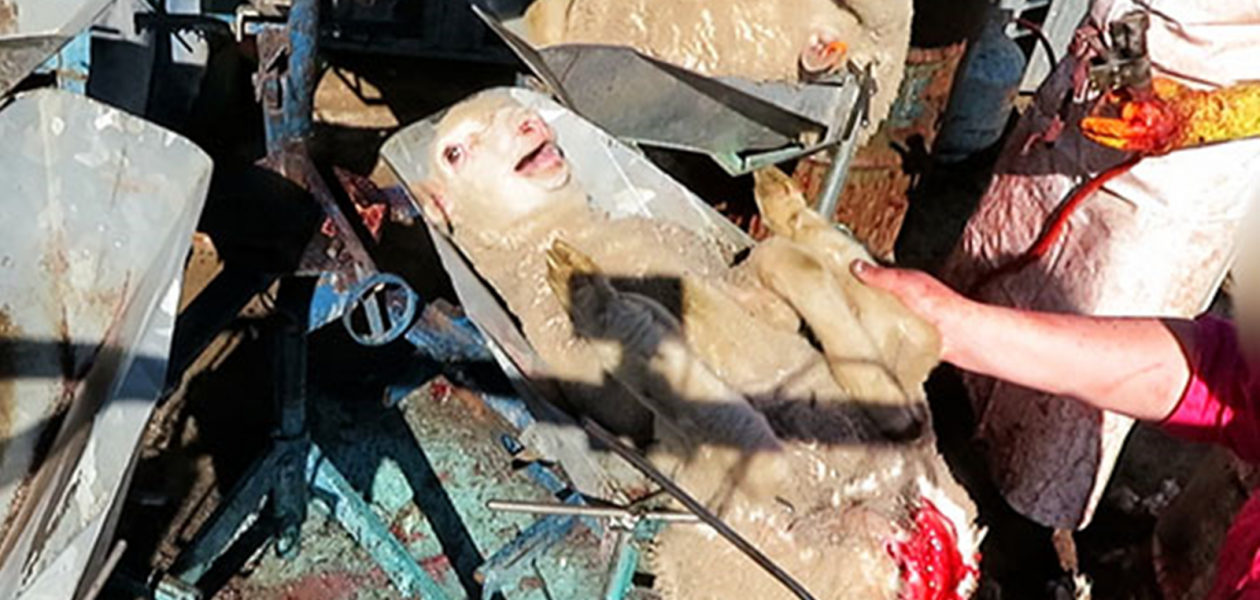|
Lamb, he recognized the reassuring touch of his mother and the faces of his friends.
When he was just a few weeks old, Charlie was snatched from his doting mother by humans who castrated him and cut off his tail, all without painkillers. Still covered in blood from these mutilations, he was huddled with other lambs in a place where he could barely move.

Around the time of Charlie's first birthday, an employee pulled him from the herd, held him by one leg and roughly shorn with sharp tools, cutting his skin multiple times. The human punched him in the face as the young sheep squirmed, screaming.
Your donation to PETA's Save Our Skins Challenge will help us prevent animals like Charlie from suffering this misery. Don't wait, PETA must reach the €50,000 goal by the June 30 deadline.

To claim that the wool industry is not cruel is completely false . There are no “human” sources of animal wool, skin, fur or feathers. None.
Investigations by PETA entities into the wool industry in Argentina, Australia, the United Kingdom and the United States revealed that sheep suffered cuts, bruises and other injuries during shearing, they suffered punches and kicks, routine mutilations such as tail docking and castration and, on Australian ranches, "mulesing" (a bloody procedure in which employees immobilize sheep and cut the skin and flesh around their tail). Shearers filmed beating sheep in Australia and Scotland have pleaded guilty to animal cruelty.
Some of these farms supplied companies claiming to use “sustainable” and “responsibly sourced” wool. This shows that the so-called "humane treatment" is nothing more than a marketing ploy. When the sheep are no longer profitable for the wool industry, they are slaughtered.

Complement
Sheep shearing is a common procedure for obtaining wool. Unfortunately, the conditions under which it is carried out are often far from ideal. In many cases, sheep are subjected to rapid and aggressive shearing, carried out by shearers in a hurry to maximize their productivity. Animals are often tied up or restrained, which can cause injury and obvious distress.
In addition, mowing is sometimes carried out without taking weather conditions into account. Sheep can be sheared even in cold weather, leaving them vulnerable to the weather. Wool is a natural protection for sheep, and depriving them of this insulating layer can have serious consequences on their health.
Consequences for sheep:
Cruel shearing has adverse consequences for the health and welfare of sheep. Injuries from rough handling are common, ranging from minor scratches to deep cuts. Additionally, when animals are excessively sheared, their sensitive skin can be exposed to irritation, infection and sunburn.
In addition, sheep are often kept in overcrowded and unsanitary conditions, which increases the risk of spreading disease and infection. Untreated health problems can quickly spread through herds, resulting in animal suffering and sometimes death.
Rethinking our practices:
It is essential to rethink our current practices in the wool industry in order to end the cruel shearing of sheep. Producers and consumers have a crucial role to play in encouraging change. Producers should adopt strict animal welfare standards, ensuring that sheep are treated with compassion and that shearers are trained to carry out their work in a safe and respectful manner.
Consumers also have significant power in making informed choices. By choosing responsibly sourced wool products, such as brands that are committed to animal welfare, we can send a strong message to the industry and encourage positive change.
Donate as generously as you can now to support PETA's Save Our Skin Challenge, which promotes cruelty-free clothing and accessories.
No animal should have to endure painful mutilation or be manhandled or otherwise abused for fashion or other trivial human fads.
Your donation today will allow us to do even more to expose the horrors of the wool industry, to organize eye-catching awareness events, to put pressure on decision-makers and to encourage consumers to make positive changes that will benefit all animals.
|







Comments